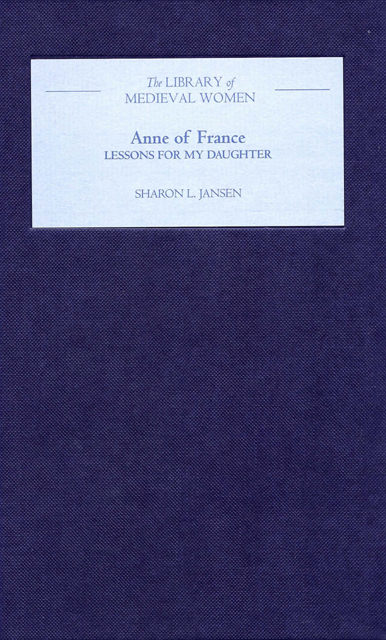Book contents
- Frontmatter
- Contents
- Dedication
- Preface
- Preface to the Paperback Edition
- Introduction
- A Note on the Translation
- Lessons for my Daughter
- Interpretive Essay
- Appendix I Louis XI, Anne of France, and the Regency Question
- Appendix II Unpublished Letters from Anne of France
- Select Bibliography
- Index
- Already Published Titles in this Series
Appendix II - Unpublished Letters from Anne of France
Published online by Cambridge University Press: 17 March 2023
- Frontmatter
- Contents
- Dedication
- Preface
- Preface to the Paperback Edition
- Introduction
- A Note on the Translation
- Lessons for my Daughter
- Interpretive Essay
- Appendix I Louis XI, Anne of France, and the Regency Question
- Appendix II Unpublished Letters from Anne of France
- Select Bibliography
- Index
- Already Published Titles in this Series
Summary
Pauline Matarasso incorporates many of Anne of France’s surviving letters into her Queen’s Mate, including three from Suzanne of Bourbon to her parents, one to her father and two to her mother. Matarasso uses these three very short letters as evidence that it “is obvious that Suzanne was the apple of her father’s eye and loved him passionately in return, that he was her playmate, companion and confidant” and that, by contrast, her “relations with her mother were much more formal and reserved,” so much more formal and reserved that Suzanne “obviously had difficulty in finding something to say.” While reaching these judgments, Matarasso does recognize that there is a danger in “inferring too much from the patchy evidence the past has left us.”
But as we have seen, Matarasso finds the Lessons “singularly lacking in love, almost shockingly so.” The only evidence offered to support her assertion is that Louis IX, when composing his instructions for his daughter, addressed her as chiere fille, “dear daughter,” while Anne addresses Suzanne with “only the cool ‘ma fille’ [my daughter] throughout.” Leaving aside the question of whether “dear daughter” expresses more love than “my daughter,” leaving aside the more important question of whether any professions of love are necessarily proof of love, and, perhaps most important, leaving aside the question of why we should demand or expect love in a text authored by a woman, I include here extracts of letters from Anne of France that do not appear in Matarasso’s book.
The letters are in Anne’s own hand, addressed to Madame du Bouchage, Suzanne’s governess, and they seem to have been written while Suzanne is still a baby, probably in the first several months after her birth. Like the manuscript of Anne of France’s Lessons, these letters were found in the Imperial Library of St. Petersburg; they are extracted in the notes of the multi-volume history of the Bourbon dukes. I have not traveled to Russia to transcribe these letters myself; I offer them here as additional insight into Anne of France and in the hope that some future scholar will trace the originals.
The first letter is addressed to ma commère; there is no simple English translation of this title, which means, literally, “my co-mother.”
- Type
- Chapter
- Information
- Anne of FranceLessons for my Daughter, pp. 95 - 98Publisher: Boydell & BrewerPrint publication year: 2004

